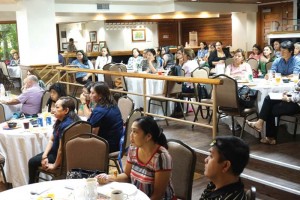‘Extending CW-1 visa program is everybody’s business’

Participants of the Society for Human Resource Management NMI Chapter meeting at the Pacific Islands Club’s Charley’s Cabaret listen to the speaker. (Bea Cabrera)
Extending the program that allows foreign workers to work in the CNMI, called the CNMI-Only Transitional Worker program, affects everyone in the CNMI.
That’s according to Alex Sablan, a former president of the Saipan Chamber of Commerce and a member of the Governor’s Strategic Economic Development Council who attended the talks with the federal government in Washington, D.C.
Speaking at the Friday meeting of the Society for Human Resource Management NMI Chapter at the Pacific Islands Club’s Charley’s Cabaret, Sablan warned no one is exempt from the impact if the CW-1 program is not extended.
“The CW-1 visa extension program is everybody’s business. You may not be a CW worker, you may not be a part of the issue, you may feel you are not going to be affected, but the real issue comes down to this—what is your economy going to look like? What is your business/offices’ focal point going to be if there are no people to do the jobs that needs to get done?” he said.
Sablan said if the islands don’t get the CW-1 extension, the local economy in large part will be reduced and everything else will follow.
Consistent with the topic was the introduction of the Northern Marinas Business Alliance, with Sablan as chairperson. The alliance is composed of officers and members of the CNMI business community. Sablan said they formed the alliance to seek a Washington, D.C. consultant to help the CNMI lobby the provisional changes needed to answer the core needs of the CW-1 visa program.
“We seek to get a 10-year extension of the transition program, to increase the cap from 12,999 to 18,000, for CNMI to have the same tool as the governor of Guam has and that is the authority to approve labor documents through Guam Labor and work to convert with [the help of] U.S. Labor and [U.S. Citizenship and Immigration Services], and impose prevailing wages for CW-1 visa holders.”
According to a recent report of the U.S. Government Accountability Office, there is an absolute need for foreign national workforce in the Commonwealth.
“Without it, even if you are a U.S. citizen who is in the Commonwealth today, whether in government or private sector, we still don’t have a sufficient workforce base,” Sablan said. “We are hopeful we transition to some type of ‘H’ visa that recognizes Commonwealth foreign workers to work all-year-round. The 18,000-increase in cap was formulated based on the casino, three hotels, ancillary businesses, and potential food and beverage business from the U.S. mainland that are just sitting on the sidelines waiting until we figure this visa thing out. Under federal law, only CW-1 doesn’t carry with it a prevailing visa. We are asking to have jurisdiction on that part so that we can establish a wage that is based on the current market value in the CNMI.”
Another challenge, he said, is the lack of a prevailing wage in the CNMI. The prevailing wage sets the salary of foreign workers being petitioned for worker-based visa.
“Today, there’s no prevailing wage in the CNMI because we missed the mark. We are currently utilizing Hawaii and Guam as focus. We have to yield to those two jurisdictions but what we need is a CNMI wage study that focuses on our economy.”
He said the alliance emphasizes that it does not seek to supplant, but to supplement the work that is being initiated and done by the government working group.
“We are in close contact with the ‘working group,’ which is the government organization composed of the administration, [Delegate Gregorio Kilili C. Sablan’s] office and Legislature. What the alliance is doing is making a wish-list request. In fact, we are going to have a presentation to the group in the middle of the month to present the provisional changes we seek as the core needs of the CW-1 visa program,” Sablan added.



























